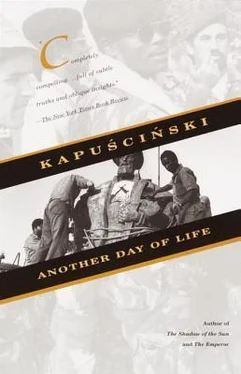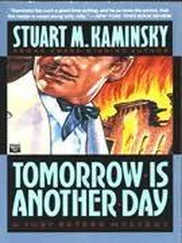One of them is Ruiz, a congenial and lively Portuguese, the pilot of an old two-engine DC-3, the only plane that the MPLA has in Luanda. The machine was built in 1943; the motors spit gobs of soot, the wings are patched, the tires are bald, the fuselage is full of holes. Only Ruiz knows how to close the door, and it’s not easy for him. He flies this plane day and night; he is in the air around the clock. Ruiz flies to Brazzaville for ammunition, and then to a besieged city in the Angolan borderlands to drop off cartridge boxes and bags of flour and take the serious casualties back to Luanda. If Ruiz doesn’t arrive on time the cities will have to surrender and the wounded will die. In a sense, the fate of the war rests on his shoulders. Ruiz flies around Angola by memory because there are no air controllers; I don’t even know if his plane’s radio works. Often he himself doesn’t know who holds the airport where he is supposed to land. Yesterday it was still in our hands, but today it could belong to the enemy. That’s why he first flies over the airport without landing. Sometimes he recognizes the silhouettes of his acquaintances, so he descends and lands peacefully. Sometimes, however, they start firing on the plane, in which case he turns back and delivers the bad news to Luanda. In this country without transport or communication, Ruiz knows what’s happening on the fronts and which cities belong to whom. He takes off at dawn, makes several trips a day, and returns at midnight. Starved soldiers in Luso, the dying garrison in Novo Redondo, and the cut-off defenders of Quibala are waiting for his plane. Now Luanda, which can’t hold out without ammunition, is waiting. The best place to find him is at the airport, when he is inspecting the motors early in the morning. Trouble with one of the motors could ground the plane and change the course of the war. There are no spare parts, no mechanics. And the plane is needed constantly. In a moment, Ruiz disappears into the cockpit. The propellers rotate, the plane is lost in thick, impenetrable clouds of black smoke and, thumping, rattling, grinding, the decrepit pile of scrap heaves toward takeoff.
The second person on whom everything depends now is Alberto Ribeiro, a short, heavyset thirty-year-old engineer. The northern front stretches near Luanda, along the Bengo River. On the banks of this river stands the pumping station that supplies water to Luanda. If the station is out of action, there is no water in the city. The enemy knows this and constantly bombards it. Sometimes they hit the pumps and they stop working. Luanda can take five days without water, no more. In the tropics people can stand the thirst no longer, and epidemics break out besides. The only person who can repair the pumps is Alberto. Thanks to him, the city has water from time to time; it can exist and defend itself. If Alberto were killed in an automobile accident on the way to the station or hit by a shell, Luanda would have to surrender after a few days.
General mobilization. Long lines of young men, mostly unemployed. Instead of holding up a wall, it’s better to do your duty — in the army, you get something to eat. They’ll soon be fighting and killing. Work at last, even glory. Packed off by their mothers and wives, a lot of women with big bellies. People will give birth and kill until the end of the world. Those who are now seeing the light of day will be twenty-five in the year 2000. Grand celebrations of the dawn of a new millennium. Meetings between youth and the veterans of the twentieth century. An interview with a spry old dame who lived through World War I. An impressive memory and dauntless coquetry to boot, the old lady mentioning how the army was marching through once and up in the hayloft she and a certain soldier, well, yes sir, I’ve got this straight, I remember it very clearly. Half of humanity will have slant eyes. Half of humanity will not understand what the other half is saying. Time to perfect methods of communicating by signs, time to begin instructions in sign language. The white race will enter the vestigial phase. Barely thirteen percent of the inhabitants of earth will have white skin. Barely two percent will have naturally blond hair. Blondes: a more and more distinctive phenomenon, a rarity of rarities. Which is better — to think or not to think about the future? Future shock: the travails of postindustrial society, luxury. For others, everyday problems: What can we find to eat today? The Bantu language has no future tense; the concept of the future doesn’t exist for the Bantu people, they are not tormented by the thought of what will happen in a month, in a year (see the Reverend Father Placide Tempels, La Philosophie bantoue ). The inductees are led in groups straight to the front. So raw and green — why? To create a false crowd, more confusion? The registration center closes at 6 P.M. People drift away and disappear into the labyrinths of the musseques, the poor quarter. The day, quite ordinary, even peaceful, ends.
Meanwhile it turned humid. The guns fell silent at the approaches to Luanda and there was no news from the other fronts. It seemed that time had stopped, that nothing was happening. The sails of our ship went slack and we found ourselves becalmed. Waiting for the storm. I felt that there was nothing to breathe. This was a special kind of oppressiveness, not to be measured in millibars. You felt it psychologically rather than physically. An invisible vise was tightening, intensifying the sense of danger and fear. I thought that it might be my own private condition, my individual depression. I started observing others. They all had the faces of people who find it oppressive. Dull, expressionless faces with smudged expressions, lacking strength, lacking charm. The feeling of closeness was so acute that all you had to do was start talking on any random topic, and soon you would be hearing that it was stifling. People had trouble talking about anything else. At all events these were unclear, foggy disclosures, because the feeling of oppressiveness is a very difficult state to define. Usually you only say that something is hanging in the air, something has to happen, something is awaiting us. There being a war on, your interlocutor states that blood will flow. This is a lesson drawn from history, and history teaches that crucial events cannot occur without bloodshed. Then comes the moment of silence in which you wonder whether it’s going to be your blood. A state of irritation and restlessness accompanies the feeling of closeness. A person unable to grasp the situation and eager to enlighten himself pays heed to the most fantastic rumors. He is afraid, he acts out irrational impulses, the herd instinct in him is easily aroused.
It becomes oppressive when important events, important changes, can’t break through to the surface of life and are continually unable to fulfill themselves. The still invisible and uncrystallized fact that is to be realized in the future is already growing, swelling, beginning to push through into a preexisting reality which, however, doesn’t want to yield. It gets tighter and tighter, and therefore more and more suffocating. The lack of air increases our feeling of helplessness. We watch the gathering of the clouds and wait for a voice to speak from them, reading us the inexorable verdict of fate.
GOOD EVENING
[Warsaw comes through]
COPY PLEASE
UNFORTUNATELY, I STILL HAVE NO INFORMATION. APPARENT CALM PREVAILS AND NOTHING IS HAPPENING, TYPICAL CALM BEFORE THE STORM. WE KNOW THAT THE INVASION IS CONTINUING BUT THERE IS NO NEWS FROM THE FRONT, BAD DAYS ARE COMING BUT THAT IS NOT CONCRETE INFORMATION FOR PRINT. CALL TOMORROW, MAYBE SOMETHING WILL HAPPEN
OK, TILL TOMORROW THEN
TILL TILL TKS
TKS BYE
Читать дальше











